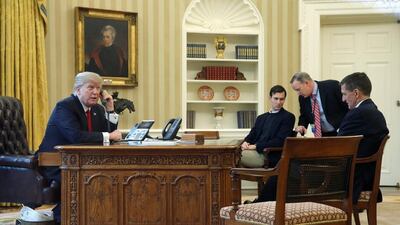Donald Trump is facing heavy criticism on human rights in the aftermath of his first international trip. The Trump administration has downplayed this issue more dramatically than any since Ronald Reagan’s first term. The implications of this shift are especially unclear because the administration has three distinct voices speaking simultaneously on human rights.
In 1981 Reagan took office determined to stop critiquing the domestic policies of Washington’s Cold War allies against the Soviet Union, even apartheid-era South Africa. This was rationalised on the grounds that right-wing dictators were “authoritarians” whose systems could evolve, whereas communist governments were “totalitarians” who foreclosed such transformations.
But during his second term Reagan shifted, recognising that there was a significant price to giving all anti-communist forces carte blanche on such international expectations. And, eventually, most of the communist states of Eastern Europe peacefully became more democratic, so the entire theory was decisively debunked.
Mr Trump goes even further.
He assures American partners they won’t be “lectured” and former tensions will not be continuing.
More significantly, Mr Trump extends this consideration to adversaries, downplaying concerns about human rights abuses by Russia, China and even North Korea, and praising their leaders personally for their supposed toughness and control.
For Mr Trump, these issues simply do not arise.
By contrast, secretary of state, Rex Tillerson distinguishes between “American values,” which he says are unchanging, and “policies”, which he says are ever-changing. “Policy”, which he casts as by definition pragmatic and amoral, in international relations must therefore always trump “values”, which are abstract or relevant only to US domestic affairs.
Rhetorically this goes beyond Kissingerian realism. But, practically, it strongly mirrors Barack Obama’s seemingly more anguished distinction between “values” and “interests”, most clearly articulated in his March 2011 speech on Libya, which he suggested was a rare instance when American values and interests coincided.
Like Mr Trump’s position, Mr Tillerson’s could be seen as squandering the laboriously accumulated American asset of international credibility on human rights and democracy. Yet on closer inspection there seems little meaningful difference between Mr Tillerson’s approach and Mr Obama’s, despite superficially distinct appearances.
Mr Tillerson is arguably just honestly articulating what, perforce, must practically be the essence of great power policymaking, the ideological orientations of its practitioners notwithstanding.
Yet, unlike Mr Trump, Mr Tillerson crucially retains space for transcendent “American values” and defines them similarly to Mr Obama, and both seem to accord them the same – highly limited – relationship to most immediate policies or interests.
Finally, UN ambassador Nikki Haley has her own approach to human rights, and perhaps overall foreign policy, even more divergent from Mr Trump’s. From her platform in New York – including during her April term as president of the UN Human Rights Council – she has thundered against abuses in Syria, Congo, North Korea, Burundi, Cuba and Iran, among others, and issued a scathing condemnation of “the situation in Venezuela”.
Yes, these are all governments that are essentially unfriendly to Washington, but one simply cannot imagine such rhetoric coming from either Mr Trump, who dismisses these issues, or Mr Tillerson, who quarantines them.
Ms Haley’s rhetoric seems more traditionally American, with human rights an important part of Washington’s lookout, but applied more stringently to foes than friends.
However, once these principles are acknowledged and incorporated into the equation, the genie is out of the bottle.
Either human rights are an issue or they are not. For Mr Trump, clearly they are not.
Mr Trump is being widely accused of selectivity for urging international unity in “isolating” and confronting Iran. But he didn’t do so on the basis of human rights.
Even when he spoke of the Iranian people’s “suffering”, “hardship and despair”, and wished for them a “just and righteous government”, it was precisely in the context of Tehran’s destabilising regional policies – especially support for terrorists and extremists, and promoting sectarianism – not its domestic conduct.
The unparalleled butchery in Syria, of which Iran is a principal author, is merely Exhibit A in this well-founded indictment.
The Trump administration – in two out of its three guises, at least – is clearly betting that dispensing with rhetoric about human rights and democracy will enhance other goals such as counterterrorism, burden-sharing and trade. But it may learn, as the Reagan administration did, that this major US asset – the “mother of all soft-power bombs” – was developed and maintained for good reason.
Of course interests and policies will often trump values. But American values are substantial, and they can’t be jettisoned without a surprisingly heavy price.
Hussein Ibish is a senior resident scholar at the Arab Gulf States Institute in Washington
On Twitter: @ibishblog


